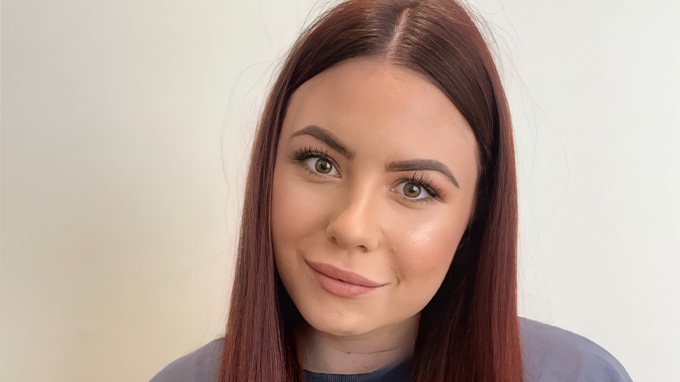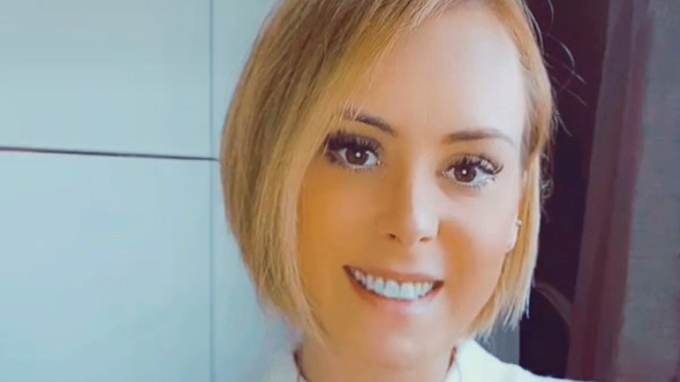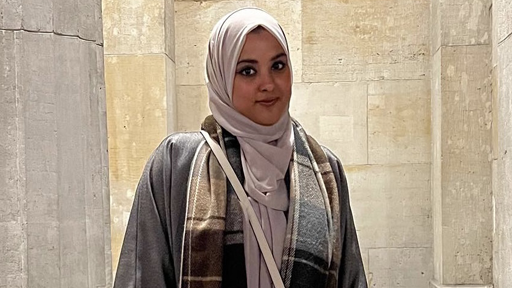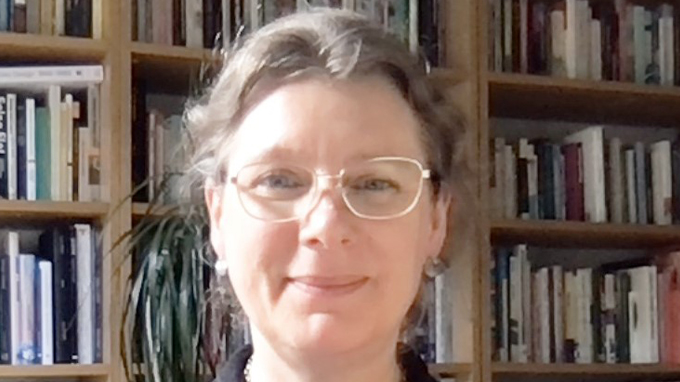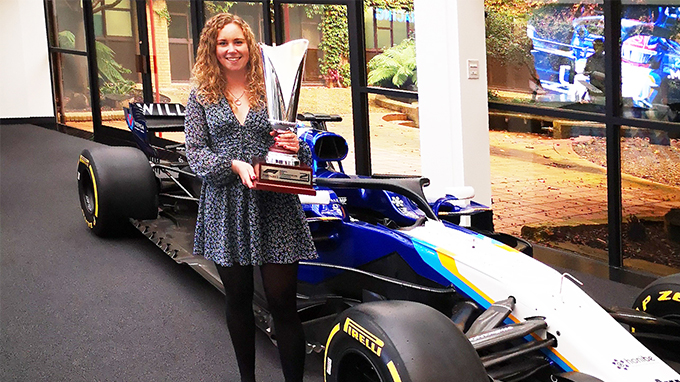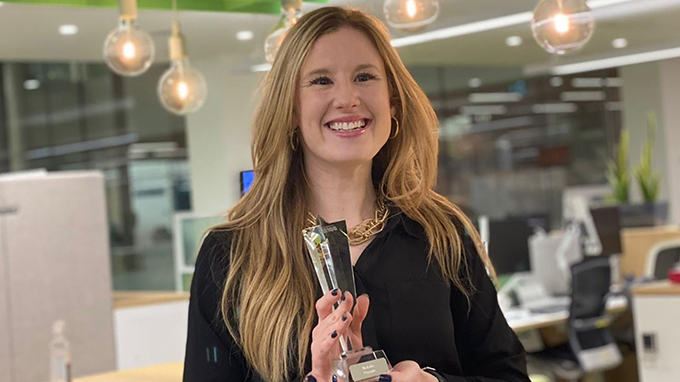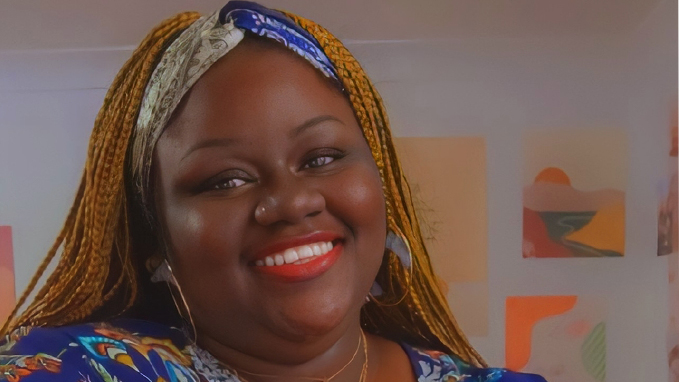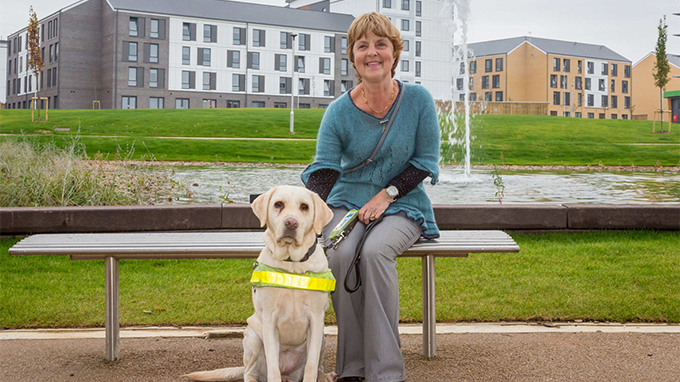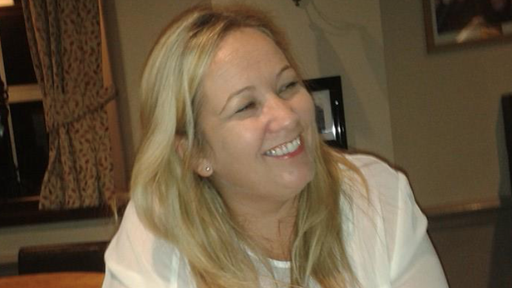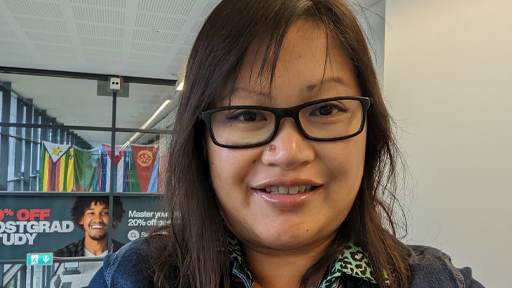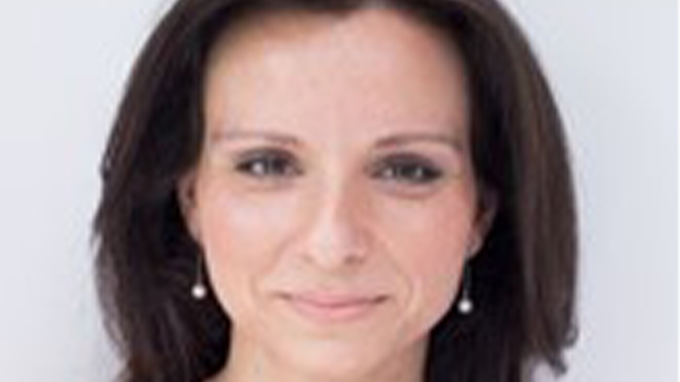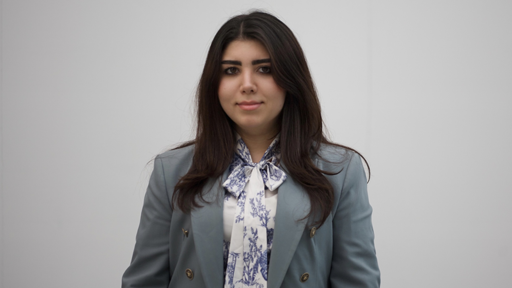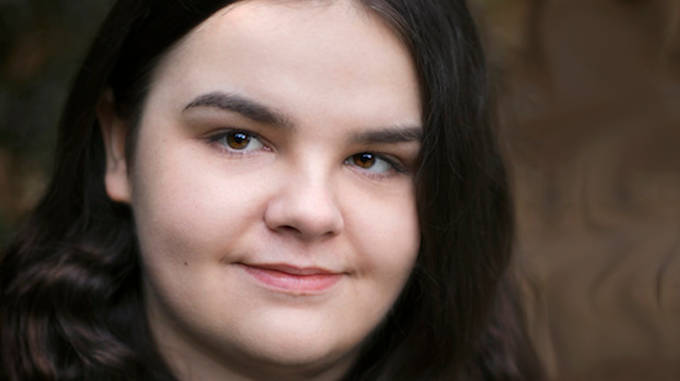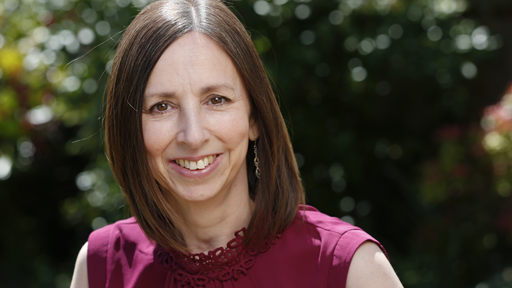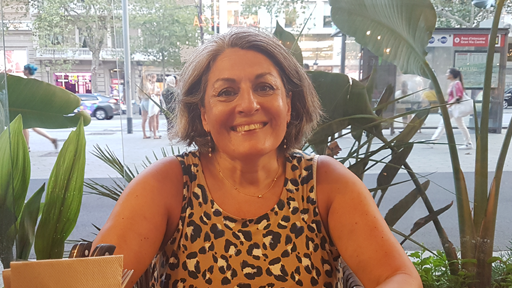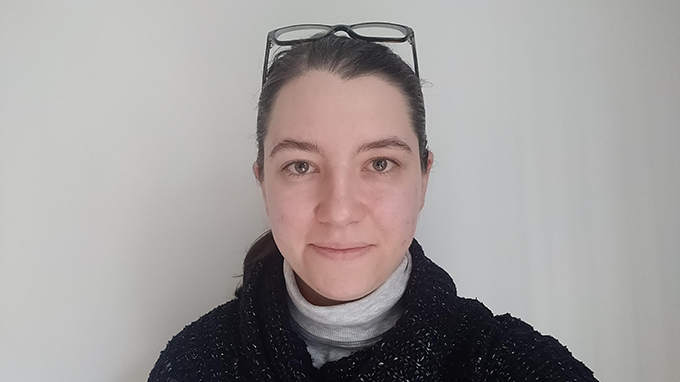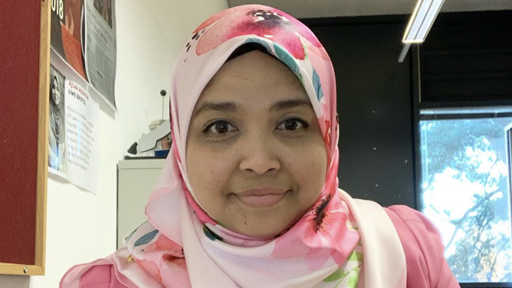Our stories
At the University of Hertfordshire, we value our students, staff and alumni lived experiences and stories. We have invited some of our amazing women to share their journeys, achievements and to tell us why International Women's Day is important to them.
Ellie Hurer
Meet Ellie, a Biochemistry PhD student at Herts and a Youth Ambassador for NATO, who is helping to spread awareness about mental and chronic illness in academia.
“Regardless of your circumstance and adversity, continue to go for your dreams don’t let anyone steal you away from it, you can do what you put your mind to and you're amazing.”
Why do you think we should celebrate International Women's Day?
As a University, it’s really important. I was happy to see we are celebrating International Women’s Day and International Day of Women and Girls in Science, it's important to celebrate women. Back in time, we could only see women as housewives and mothers so it’s important to have a day where we celebrate what women can and have achieved and where they are now. Especially as a University because we are where lot of people go to start their careers. Through time, a lot of movements have happened allowing women to be at the forefront of everything to show that women are just as important as men.
What do you think people can do to break the bias?
I think it’s down to individuals, it starts with you. So, to always talk positively about women, show encouragement, achievements, and not treating women different to men. In job roles it’s important, showing equality in having men and women in senior positions. It starts with you, to share your thoughts and share awareness about facts and figures and how things have changed. We need to show why it’s important that we break the bias so in times to come we won’t have to have these conversations, it will already be normal. If we don’t speak up about it now, that won't happen. If people keep quiet, nothing will change.
What has been your greatest achievement so far?
In terms of education, I was not the best behaved during my GCSEs and was part of the wrong crowd, I did perform okay in them but this left low expectations for my performance in A-Levels. I really wanted to turn that around, and I ended up achieving high level grades to be able to go to University. At Herts, I achieved the Undergraduate Achievement Award from the Biochemistry society because I accomplished the highest grade out of the cohort. Now I’m doing my PhD at the University of Herts, too.
In life, I’ve gone through a lot with my illness, so I created an online platform to raise awareness, getting 40,000 followers total online. The main message I try to spread is that regardless of what you’ve been through, you can achieve anything. Hopefully I've inspired a lot of girls to go through STEM subjects and fulfill their dreams. Just take it day by day and don’t stress, that's the key.
Who is your female role model?
My female role model at the University of Hertfordshire is Dr Maria Dimitriadi, because she continuously inspires young women to excel in science, offers so many ways to give, and dedicates a lot of time to giving experience to anyone who wants it. Since she's joined Herts the research by women has changed in the Department of Biosciences. I appreciate her greatly; I hope to be as good or half as good as she is.
In life, I can’t think of just one inspirational woman because there’s so many. I think anyone who’s faced the odds, achieving what they wanted to achieve despite other people’s opinions and their circumstances, is inspirational to me because that’s what I hope to do in my life.
Stephanie Pryszlak
Meet Stephanie, a Law graduate who is raising four children and is now working as a Paralegal for a Legal 500 law firm.
As long as you get yourself into a routine, and make sure you’re doing things when they need to be done, you can work, have a family and complete your studies. Time management is key.
Why do you think we should celebrate International Women's Day?
Because there are so many incredible women achieving amazing things and they are an inspiration to others that you can do whatever you dream and put your mind to!
What do you think people can do to break the bias?
You have to keep going, you have to ignore those around you, stay in your own lane and break them with success. Sharing people’s stories as well as successes is key to uplifting morale. Some people and I were one of them, think that because of who they are, where they are from etc., they can’t achieve greatness... but everyone has a back story, and you are your own limit.
What has been your greatest achievement so far?
My biggest achievement sounds silly, but it is really and truly just being here and being me. I have been through things some people couldn’t even imagine and it has been an ongoing rollercoaster, but I have pushed through, and I have not let it change the person I am. I have let it strengthen me and I have learned from it all, but I would like to think that I am kind and caring and that although I don’t always do the right things, my heart is always in the right place.
Who is your female role model?
My female role model is my Nanna. She was the kindest and most caring woman I have ever met. She was selfless, had a heart of gold and never judged. She was strong and always knew what to say. I hope that I am making her proud.
Mina Uddin
Mina Uddin, Teaching Fellow in the School of Life and Medical Sciences
Mina is a Teaching Fellow and Pharmacology PhD student at Herts. Read on to find out more about her journey and greatest achievements.
How did you come to work at the University?
I completed my undergraduate degree in Pharmacology at Herts and then went on to complete a master's degree at UCL. I found my passion for science and research at Herts and was ecstatic at the opportunity to return to the University as a staff member! Currently, I am a Teaching Fellow in Life and Medical Sciences and a part-time Pharmacology PhD student. It was a fantastic experience to be able to return to Herts and reconnect with the lecturers and technical staff that supported me as an undergraduate. I am now able to support current students through my Teaching Fellow role.
Why do you think we should celebrate International Women's Day?
International Women's Day is our opportunity to celebrate the achievements of women from every area of society, but it is also our opportunity to acknowledge and raise awareness of issues that women face today, whether this is unconscious bias, negative stereotypes, or unequal representation in the workplace. We are continually working towards equity for women, and International Women's Day is in an important part of reaching that goal.
What has been your greatest achievement?
My greatest achievement so far at Herts was being successful in the interview for this role. I interviewed for the Teaching Fellow role and PhD opportunity remotely, in isolation, with COVID! The interview panel (my current line manager and colleagues) were brilliant and let me take as many breaks as I needed to be able to cough, sneeze, and breathe! I am also the first in my family to attend University, complete a master's degree, and have the opportunity to pursue a doctoral degree.
Who is your female role model?
My female role model(s) at Herts are my two supervisors Associate Professor Lisa Lione and Dr Sara Pritchard. I am very proud to say that I have an all-female supervisory team, who are both fountains of knowledge and guidance. They're also extremely supportive and always push to me to be my best. My female role model in life is undoubtedly my mum. She has spent the last 26 years encouraging me to aim high and supporting me in overcoming many personal challenges to get where I am today, while also working in the NHS, and being an amazing homemaker.
Professor Dr Grace Lees-Maffei
Professor Dr Grace Lees-Maffei is the first professor of design history at the University of Hertfordshire and the first female professor in the School of Creative Arts. Read Grace’s story of her career journey and what she thinks we can do to break the bias.
How did you come to work at the University?
My career history is non-traditional in several ways. I answered a job advertisement in The Guardian in 1995 while writing the dissertation for my two-year full time MA at the Royal College of Art. I combined this hourly paid work with similar work at other universities and the V&A, until 1st January 1998 when I took up an establishment faculty role at UH as a Lecturer (0.75 FTE) alongside studying part-time for a PhD at Portsmouth. I was appointed Senior Lecturer (0.75 FTE) in 2000 and then had two non-consecutive years of maternity leave before being appointed Reader (0.75 FTE) in 2010 which I combined with visiting professorships in Lisbon and Amsterdam. I was appointed Professor (1.0 FTE) in 2017.
Why do you think we should celebrate International Women's Day?
Women have experienced thousands of years of sexism, to the detriment of humanity, and the problem is ongoing. Women are at least as capable as men across the fields of human endeavour. We need to celebrate our achievements, to draw attention to them as a counter to the prevailing tendency of the patriarchal culture we inhabit to marginalise and discredit women, our skills, experiences and expertise.
What do you think people can do to break the bias?
It is essential to promote more women to positions where we can make a difference as visible role models. Women can help other women to succeed. There is much distance still to travel in terms of the gender pay gap, and recruitment and promotion strategies.
What has been your greatest achievement?
I am very proud of my children. In career terms, I am proud of being the University of Hertfordshire’s first professor of design history and the first female professor in my school. It is a privilege to help develop the next generation of women in the fields my work engages, which I do as a research leader, research supervisor, mentor, programme director, and editor.
Who is your female role model?
In my field of design history, I deeply respect Professor Penny Sparke (Kingston) and Professor Emerita Cheryl Buckley (Brighton). I sometimes ask myself ‘What would Cheryl do?’
Katie Dobson
Katie knew that she wanted to pursue a career in Motor Sport and saw the course at Herts as the perfect pathway to follow her dream.
She is currently an Aerodynamic Design Engineer with the Williams Formula 1 team and explains a bit more about her role and what it entails, ‘I was lucky enough to join Williams F1 as a Junior Aerodynamic Design engineer after completing my MEng in Automotive Engineering with Motorsport at Herts.
My role involves designing mechanical and aerodynamic components for the wind tunnel. I lead the research and development for the wind tunnel front wing design and work closely with the aerodynamicists to improve design concepts and make wind tunnel tests as streamlined as possible.’
Working in Formula 1
Katie really enjoys the challenge of the role and the industry which is fast-paced on all fronts.
‘Working in Formula 1 is very enjoyable and very rewarding when you see results on the track. Seeing Williams back on the podium and scoring points again in 2021 were particular highlights.
I also enjoy the fast-paced environment and continual research and development required to keep up with technology and rules changes.’.
Why Herts?
Katie chose to study at Herts because she was impressed with the large range of studies provided by the Engineering department and the range of facilities which provided crucial hands-on experience to work in industry. She adds, ‘I was particularly impressed with the extra-curricular groups and studies provided by Herts such as the Formula Student team.’
When she talks about the best part of her course she says, ‘It was being able to apply what I had learnt during my A-Levels to further my knowledge of engineering and the knowledge and enthusiasm my lecturers had to further my studies.'
Formula Student
Knowing that hands on practical experience is so important in the industry Katie became a member of the successful Formula Student team at Herts. She is certain that it helped when it came to her career and says, 'Participating in Formula Student particularly aided my ability to gain my current role in industry.
It was able to provide me with this expertise and allow me to broaden my field of study outside of the classroom or lecture hall.’
Favourite memories
Unsurprisingly Katie’s best memories revolve around her experience with the Formula Student Team and the success on and off the track.
‘My favourite memories at Herts were the times spent designing and manufacturing UH19 and UH20 with great friends. My favourite of them being completing at FSUK, FS Czech and FS Germany with the most successful UH FS car of all time as well as winning design at both the UK and Czech competitions.’
The future
Katie has set her sights high when it comes to the future and what it could bring. ‘My future plans are to advance my career further in motorsport, and to hopefully win a Drivers and Constructors Championship in F1.’
'Participating in Formula Student particularly aided my ability to gain my current role in industry. It was able to provide me with this expertise and allow me to broaden my field of study outside of the classroom or lecture hall.'
Natalie Pringle
Meet Natalie Pringle a Law graduate who has excelled in a varied career based across the UK and SE Asia. Natalie is listed in the 2021 TechWomen100 Awards and supports start-ups in the tech space through an accelerator programme run by international law firm, CMS.
Why do you think we should celebrate International Women's Day?
International Women’s Day is an opportunity for us to celebrate the work that we have done, and the progress made by women, and for women, from all backgrounds. We are also encouraged to reflect on ways that we can continue to change the narrative and pave the way for future generations.
In my role at CMS, I am incredibly privileged to meet and support inspirational female founders who are at the cutting edge of new technological developments across a variety of sectors. I work alongside a fantastic team of colleagues who embrace an ‘intrapreneurial’ approach and proactively embrace diversity and inclusion in the workplace.
I truly believe that if we can see it, we can be it. This is why the work that we each do on an individual level is so important. There will always be someone watching and inspired to push themselves beyond their comfort zone, whether a co-worker, a friend, family member or informal mentee – the benefits are amplified beyond the initial impact created. This is why we must keep working together to make a change for the better and involve everyone in the conversation about Breaking the Bias.
Natalie's career successes
Natalie is listed in the highly prestigious 2021 TechWomen100 Awards. These awards highlight remarkable women within the technology and STEM sector, and Natalie has been recognised for the technology focussed business start-up accelerator programme she runs at global law firm CMS. This programme provides legal advice, training, mentoring, and networking for clients all over the world, focussed on different markets. Natalie also offers thought leadership and speaks at industry events focusing on empowering women in technology.
Talking about the award Natalie said, 'I’m incredibly honoured to have been featured as a TechWomen100 and recognised by these prestigious awards. Run by the WeAreTechWomen team, the awards consistently feature the brightest stars and trailblazers in the tech industry, and it is a huge privilege to be included amongst them.'
Prior to joining CMS, Natalie was working in Asia and made the move when invited to establish the Hong Kong office of a London based real estate firm. This later led to her establishing her own property investment company which assisted clients throughout SE Asia. She also launched a division of The New Savvy, a financial investments and career platform in Asia, dedicated to helping women improve their financial wellbeing and raising awareness of the importance of financial literacy.
In addition to this she managed a programme for Hong Kong based Splash Foundation, which empowers individuals in under-resourced communities through swimming.
Natalie’s memories of Herts
Natalie took full advantage of the opportunities on offer within Hertfordshire Law School including extra-curricular activities like mooting, debating, trips to Inns of Court, as well as attending talks from guest speakers. She says, ‘These opportunities helped me gain confidence and have shaped the person I am now. This experience helped me to see that if you are willing to put your time and commitment, then many other doors will open for you.’
Her favourite extra-curricular activity was being involved in the mooting team as she competed across the UK. She says, ‘The skills I learnt while on the mooting team are invaluable and the overall experience was fantastic. These experiences have been extremely beneficial throughout my career and provided me with the knowledge and confidence to speak in public, research and shape a legal argument.’
Ashley Chinwendu Nkemakolam
Meet Ashley, a Herts graduate and a Paralegal at Rayden Solicitors, a firm she was introduced to whilst volunteering for Hertfordshire Law Clinic.
Growing up, I had several teachers who knocked me down or discouraged me from pursuing my dreams, but the minute I stopped listening to them and focused on my own voice, I began to view the world in a new light.
Why do you think we should celebrate International Women's Day?
There is no denying that in society women and men are on an unequal footing. International Women's Day is a day elevating women and showing support to gender equality. It is a day that amplifies our voices for a call to action to accelerate equal representation in all sectors of society. On this day, we celebrate and honour all women from all around the world, uniting in solidarity for the advancement of gender equality.
What do you think people can do to break the bias?
Firstly, I think people should acknowledge the unconscious biases that we are taught from an early age, such as maths, physics, and engineering being considered "male" subjects while home economics, arts and crafts, and etiquette are considered "feminine." Statements such as “women should be seen and not heard" or “boys will be boys” need to be eradicated from society. I also believe that institutions in society should modernise their approach by concentrating on building a more balanced and inclusive talent pipeline that is welcoming to all qualified members of society regardless of gender, race, age, sexuality, or beliefs.
What has been your greatest achievement so far?
Growing up, I had several teachers who knocked me down or discouraged me from pursuing my dreams, but the minute I stopped listening to them and focused on my own voice, I began to view the world in a new light. It wasn't the gloomy and submissive place they had led me to expect; it was a place full of fantastic opportunities and teachers who truly cared about you. As soon as I realised and started working in this new awareness, I began to see myself thriving in my academics. I was awarded the best graduating student in my sixth form college, and when I got into the University of Hertfordshire, I worked hard, became a student rep, volunteered at the law clinic, became the SCO, spoke with legal professionals at the top of their fields, and I am making my mark with a degree that many teachers predicted I would underperform in. Overall, my greatest achievement so far was believing in myself as a girl child especially coming from my part of the world, Africa.
Who is your female role model?
My mum is undoubtedly my female role model. She is a cheerful and compassionate woman who sees the best in everyone and everything around her. I come from a country where people thought that educating a female child was a waste of money and time and that the only education she needed was to learn how to cook and clean. My mother defied these norms by raising my sister and I to be strong independent women capable of achieving our own greatness, rather than simply existing for the sake of others or growing up just being submissive to a man. She continues to tell my sister and I on a daily basis that we must continue to work hard in order to soar as the wings on Eagles; especially in a world where the odds are stacked against the girl child. Nothing seems insurmountable when you have a solid cheerleader constantly rooting for you.
Dr Julia Schofield
Julia Schofield received a Bachelor of Science Degree with Honours in Computer Science at the Hatfield Polytechnic in 1975. She was the first registered blind female Computer Science graduate in the UK.
Julia had a hugely successful research and business career as a leading technology consultant and she was a champion for utilising technology to meet the needs of people with disabilities. Julia’s work was rewarded with the Women of the Year Frink Award in 1982 and an MBE for services to the computer industry in 1992.
Julia remained connected with the University throughout her life and was awarded an Honorary Doctor of Science in 2007. In 2016 Julia officially opened Schofield Court, a new student accommodation block on the College Lane Campus, named in her honour. At the event Julia said, “I am lucky because my time at Hertfordshire enabled me to get into a field I really wanted to work in”.
Julia also generously donated financial support by providing student prizes to encourage future innovation in computer science to aid the lives of people living with a disability.
Mark Jenkin, former Associate Dean for the School of Computer Science, pays tribute to Julia:
“Julia came to study at Hatfield Polytechnic in 1971 from the nearby Chorleywood College, run by the Royal National Institute of Blind People for girls with little or no sight. She always felt that going to a specialist school was right for her and it certainly equipped her with amazing skills to overcome her disability such as braille, cooking, knitting, and mobility. At Chorleywood she was taught Computer Science by the late Dr Bill Tagg from Hatfield. She was encouraged by him and her headteacher to be one of the very first blind people worldwide to study the subject at degree level. Computer programming was considered a promising profession for blind people, but almost all were men.
I first came across Julia in her second year at Hatfield Polytechnic. To my surprise her tutor approached me and asked if I could read to her as she thought I had a nice voice. Reading aloud coursework and textbooks was one of the adjustments lecturers made to support her. In class we made sure we spoke clearly, avoided visual gestures, and provided tactile diagrams. Julia would write notes in braille on her very sturdy mechanical Perkins Brailler as there were no high-tech aids in those days.
From 1973, Julia was accompanied in class by her guide dog Pam, who most of the time slept quietly, but occasionally would show what she thought of the lecture by yawning loudly. Pam had two weaknesses; roaming when on a free run and swimming. One day I had to collect a very wet and slimy Pam from Hatfield Police Station, my most embarrassing moment ever!
In the 1970s we all used 10 character per second Teletypes for input and output to the computer, which we used mainly for programming. There were no braille terminals or printers, so Julia organised the manufacture of prototypes and wrote software to produce braille output. She later acquired one of the first reading aids, an Optacon. This used a camera to scan the text, with individual letters turned into a tactile impression read by a finger.
Julia undertook industry placements during her studies, and for her second six-month placement Julia went to the very prestigious IBM Hursley. At the time, IBM was the world’s foremost computer company and Hursley was a globally renowned research and development centre. This experience led Julia to secure her first full-time job in 1975 at the National Physical Laboratory (NPL), an internationally important research organisation. There she worked in a group looking at human interactions with computers, in particular on MAVIS, a microcomputer-based aid for people with very limited control of movement. This was way ahead of its time and led Julia to embark on a PhD in Computer Interface Design. Again, Julia was the first blind person in the UK to be awarded this.
After NPL Julia’s career flourished. She formed her own software company, employing many staff, travelling the world, and carrying out consultancy and developing systems, typically involving human-computer interaction for well-known organisations in retail, government and health. Some of her biggest customers were car companies including Volvo, Daewoo and Toyota. For five years, she was also the chair of the British Computer Society’s then Committee for the Disabled.
Julia was a pioneer and an inspiration for women and disabled people, and for Computer Science in general. In 2007 when Julia was awarded an Honorary Doctor of Science by the University of Hertfordshire, Professor Jill Hewitt, former Dean of Computer Science said, “It is our pleasure to associate our university with the many tributes paid to Julia for her ingenuity and skill in helping to improve the quality of life for so many”.
Julia was always a pioneer, with her good humour, charm, drive, and determination overcoming obstacles that would have deterred almost everyone else.”
Carol Taylor
Meet Carol, Research Delivery Support Officer and Co-Chair of the Menopause Network.
How did you come to work at the University?
I had a place to study Midwifery at the University but fell pregnant with my youngest. This took us to three young daughters, and it just wasn’t feasible to study at the time. I then applied for the part-time role in CPD Health Admissions in the Faculty of Health and Human Science (as it was then) and I'm now in my 21st year at Herts! I recently changed roles and now work in the School of Life and Medical Sciences as a Research Delivery Support Officer.
Why do you think we should celebrate International Women's Day?
I love the conversations and actions of women supporting women, both socially and in the workplace, and more recently in relation to all things perimenopause and menopause. We need to support and celebrate each other, make connections and collaborations, build each other up, if we believe, we can achieve. I also love the quote:
Here’s to strong women:
May we know them
May we be them
May we raise them
What has been your greatest achievement so far?
This is a hard question as some days it’s been an achievement to just get out of bed! Seriously though, for me I’d have to say getting to a point in life where I’m just happy and content with myself.
Who is your female role model?
To be honest I have, and have had many role models in my life, but I mostly I draw from my close friends and family members. For me, any woman who believes in herself and supports other women, is a role model in my mind. I’m currently loving Roxie Nafousi, Mel Robbins and Rupi Kaur.
Hanh Doan
Meet Hanh, Student Success and Engagement Advisor (Black Asian Minority Ethnic/Equality Champion) and Visiting Lecturer in Initial Teacher Education.
How did you come to work at the University?
I was a secondary music teacher for 19 years until 2021, when I took a career break. I live quite locally and saw the job for Student Success and Engagement Advisor in the School of Education and took up the post in March 2022. I am now also a Visiting Lecturer in Initial Teacher Education and a Visiting Tutor for the Secondary PGCE. I am pleased to be using my skills in a different way but still having a positive impact on young people.
Why do you think we should celebrate International Women's Day?
We have lived in a patriarchal society for thousands of years and despite progress in many areas, continue to do so. We must continue to celebrate women and their achievements, and make a commitment to promoting them to influential positions. I believe it is important to promote IWD positively in order to counterbalance patriarchal bias and the marginalisation of women, their skills and experience.
What has been your greatest achievement?
I am very proud of my teaching career and the number of students I helped to discover the joy of music and the intrinsic value of learning. There have been many highlights within that, including three book publications, but creating a safe and musical environment for those in my care will be something I will cherish.
Who is your female role model?
It's impossible to pick, which can only be a good thing. I have looked up to Jacinda Ardern in recent years, the way she showed strength in difficult times, but also when she decided it was the right time to step away from her role. I am also a huge fan of Michelle Obama and her commitment to working with and for women in all walks of life, in particular those from Black, Asian and Minority Ethnic backgrounds.
Dr Maria Dimitriadi
Meet Dr Maria Dimitriadi, Reader in Molecular Genetics and the Bioscience Research Lead in the School of Life and Medical Sciences.
She leads a lab that focuses on the genetics and on the cellular and molecular mechanisms that underlie motor neuron diseases – in particular, a devastating motor neuron disorder called Spinal Muscular Atrophy (SMA), which is the primary genetic killer for infants.
Maria is also co-chair of the Network of Women(+) Professors (NW+P) at Herts, which ensures the University has equal gender representation at all levels.
“Go out to the world and do great things! Do not let anyone steal your curiosity, inspiration, and passion for science!”
What has been your experience at Herts been like?
“The experience has been great, and I have always had amazing support from my line managers and colleagues at the School of Life and Medical Sciences. Being promoted to a Reader has also given me the opportunity to lead the NW+P mentoring scheme that offers individual mentoring support to people who identify themselves as women aspiring for Reader, Associate Professor and Professor levels at the University.”
“When I receive a lovely message from my students about my research-informed teaching, I always save it in a special folder on my computer. When working life knocks me down at times, I open the ‘magic’ folder and these messages become my driving force. I inspire students and they inspire me back!”.
Who is your female role model?
“Professor Anne C. Hart was my post-doctoral mentor at Harvard Medical School & Brown University during my studies in the US. She has contributed immensely to my decision to follow an academic career path and for this I will always feel enormous gratitude. I do not believe I would be here today without Prof. Hart’s encouragement, support and guidance.”
Pegah Janbakhsh
Meet Pegah, Senior Technical Officer for Aerospace Engineering in the School of Physics, Engineering and Computer Science.
How did you come to work at the University?
I was fortunate to have been given the opportunity at the University of Hertfordshire as a Senior Technical Officer for Aerospace Engineering straight after I graduated. I was able to apply my knowledge and skills gained during my degree to the role, and the University saw the potential I had to offer. I became successful for the position due to my high performance during my studies and the experience I had gained in the field of Aerospace and Pilot Studies.
Why do you think we should celebrate International Women's Day?
International Women's Day is an important opportunity to recognise and celebrate the achievements of women around the world and to advocate for greater gender equality. It is a day to recognise the progress we have made in achieving gender equality, and to redouble our efforts to ensure that women everywhere have access to the rights, resources, and opportunities they need to participate fully in society. By celebrating International Women's Day, we send the message that women are valuable and should be treated with respect, and that together we can create a more equitable and just world.
What has been your greatest achievement?
My biggest achievement so far is completing my degree in Aerospace Systems Engineering with Pilot Studies and securing a full-time role as a Senior Technical Officer for Aerospace Engineering at the University of Hertfordshire. This is a huge accomplishment, especially considering the fact that I only moved to the UK in 2015 and English is my third language. Moreover, I am now on the path to furthering my career by beginning my PhD project in Aerospace Engineering.
Who is your female role model?
Professor Maryam Mirzakhani was the first Iranian and the first women ever to win the Fields Medal, also known as the Nobel Prize of Mathematics, who has achieved great success and has inspired me to reach for my goals and dreams. Maryam Mirzakhani is the perfect role model for anyone aspiring to reach their goals and make a difference in the world. Her perseverance and dedication to her craft was remarkable and her success is something to aspire to. Her spirit, determination and intelligence are something to look up to and strive for.
Sophie Tennison
Meet Sophie, a second-year music industry management student at Herts who is leading our Disabled Students’ Network.
Sophie came from a performing arts background and is a member of the National Youth Theatre. She’s also worked with Graeae Theatre Company and Scope the disability charity on the Scope for change campaign – teaching young Disabled people to become campaigners. She often has public speaking engagements including speaking in Parliament and for charities such as the CVI society and Guide Dogs
Why do you think we should celebrate International Women’s Day?
Because we are still in an age where violence and prejudice towards women is high.
Particularly against Disabled, deaf, Black, Asian, BIPOC and LGBTQ communities.
International Women’s Day is about reminding everyone we have more to do to enable everyone is able to live their lives without discrimination, bias, and prejudice.
What does equity mean to you?
That everyone can live their lives without discrimination, bias, or prejudice. Enabling people to have the means to thrive in their own way.
What is your proudest moment so far?
There’s too many to single out! I think in terms of my university experience, it would either be getting into university, which meant returning to education after a traumatic experience previously. Or being the first in my family to go to university.
This year, I also moved into halls - the opportunity to live independently, which as a Disabled person is a big thing for me. As for life itself, making it to 25 is monumental given my health.
Who is your female role model?
I have a few! Although I try not to because the last time I had a role model, I tried to become a Paralympian like them and broke my arm!
My mum is my biggest role model. One of my tutors at Herts, Maria Thomas, who covers multiple courses in different schools but still has given me so much support and advice as well as encouragement in my studies. She encouraged me to undertake the degree even though I had been out of education since I was 14 and would be coming from a SEN school with little educational qualifications. I hope one day I’m as cool as she is.
Then in terms of disability, a great role model for me is Imani Barbarin. The Disabled community itself. And then Hayley Williams from the greatest group Paramore!
Jill Lees
Meet Jill, our Learning and Organisational Development Team Leader and Co-Chair of the Disability and Wellbeing Network (DAWN) here at Herts.
How did you come to work at the University?
I joined as a Staff Developer in 2003 and then progressed to People Development Manager, I have worked with many colleagues and been based in many different buildings and offices over my 19 years. I came from a retail management background, and it was quite a change of environment, it took me about a year just to understand all the acronyms!
Why do you think we should celebrate International Women's Day?
Although we have had over 50 of gender equality laws, we still don’t have gender equality. It is important to celebrate women’s successes and learn from their journeys to raise awareness of what women can achieve and break down stereotypes.
What has been your greatest achievement?
Returning to work after becoming unexpectedly disabled in 2013 and still being here 10 years later! I had emergency open heart surgery which lasted 13 hours and caused damage to the nerves in my legs and resulted in me spending five months in hospital. I returned to work using a walking frame working just two hours a day,two days a week and with the support from my colleagues built up to my full hours and responsibilities again. I had another open heart surgery two years later in 2015 and won the ‘Colleague of the Year’ Vice-Chancellor's Award that year, which meant so much to me.
I am also proud to be Co-Chair of the Disability and Wellbeing Network (DAWN) as I know how important support from colleagues is and the importance of raising disability awareness.
Who is your female role model?
My daughters – one works in the Oil and Technology industry, a very male dominated field, and proves herself to her male colleagues every day, while also running a women’s group to support and encourage more women into STEM workplaces. My other daughter is deaf and is halfway through her PGCE to be a primary school teacher, she has always been a strong feminist and is particularly passionate about girls’ rights to education worldwide.
Laila Salamat
Meet Laila, an Insurance Administrator in our Finance team and Co-Chair of the Menopause Network.
How did you come to work at the University?
I was working on site for Bouygues, a construction company where I was based on College Lane campus for a one year temporary contract. When the contract ended it was suggested by a friend who worked at the University to apply for an administrative role. I worked in MacLaurin in Human Resources for three weeks and then got transferred over to Uno bus on a casual basis. I think working on a building site set me up to deal with anything. I became permanent at Uno bus and worked there for seven years until I needed to change my hours. I now work in Finance as administrative support to Alistair Moffat and his team, which is lovely.
Why do you think we should celebrate International Women's Day?
The importance of celebrating our achievements, to reduce the inequalities, gender pay gap, women have come so far but more inspiring conversations about how women are an important role in the workforce.
What has been your greatest achievement?
Having a daughter that is successful and confident and is achieving goals in her career. Running a successful business being self-employed. Motivating and encouraging fitness and wellbeing.
Who is your female role model?
Many female figures - I don’t have a role model as such, but young women like Greta Thunberg, an activist against global warming is inspiring and shows how she wants to make changes. Cherry Mosteshar – author of the book 'Unveiled', I read this book when I was a young woman, which is about love, death and being a women in Iran and the Ayatollahs – the society pushing women down and covering them up. You cannot avoid the temptation but you have to resist it!
Any strong women who are confident and want to make a difference. Even Margaret Thatcher has her place as a role model being one of the first women Prime Ministers, politics aside.
Paulina Milewska
Meet Paulina, a first-year computer science student at Herts who is also working as a student technology mentor.
“I raise up my voice—not so that I can shout, but so that those without a voice can be heard. … We cannot all succeed when half of us are held back." – Malala Yousafzai
Why do you think we should celebrate International Women's Day?
We need to celebrate International Women’s Day to remind ourselves that there’s still no equality for men and women in the world, and even though in this country the gap may be bridging, there are still many places in the world where women’s human rights are not being respected. We should also include men in the celebrations, a lot of them want to be our allies in fight for equality.
What does equity mean to you?
Equity means that people from different backgrounds, and with different levels of privilege, should get the same opportunities regardless of their social position. In simple terms - levelling out the playing field for all genders and races.
It's all about empowering people, making sure no talent is wasted and helping improve living standard. Initiatives like ‘Code First Girls’ or ‘Black Girls Do STEM’ help achieve equity by giving women from different backgrounds a chance to learn in an environment that is friendly and understanding of their specific struggles.
What has been your greatest achievement so far?
My life has been full of achievements, I can’t just point at one and call it my greatest. My philosophy is to never stop learning, developing, and reaching new heights – and sometime that means ‘achieving’ something along the way. Maybe in that sense my greatest achievement is the person I am today.
Growing up in a place with little opportunities, having been told by my teachers I would never make it in computer science, struggling with my own identity because of internalised misogyny and bias, I still managed to come out the other side. I am mindful of my own shortcomings, and I am actively working on them every day, even though it would be so much easier to bury my head in the sand.
Who is your female role model?
There are many great women that inspired me throughout my life but let me tell you about my two biggest heroines.
American soprano, Jessye Norman showed me that you can fight for a cause without animosity, but still meet your goals and maybe even change minds. She was an image of grace and kindness, but she fought for racial equality with laser focus.
Maria Skłodowska-Curie who unapologetically lived and died for science, while also being a mother. She was passionate, true to herself but also strong and nurturing to her children. She was the first person to win two Nobel prizes, and her daughter Irene also received one about twenty years later. As a mother, I hope I can give my daughter the encouragement and opportunities for development so she can meet her full potential, just like Maria’s daughter did.
Dr Ajlaa Mokhtar
Meet Dr Ajlaa, Senior Lecturer in Human Resource Management and Deputy Programme Leader for MSc Management.
How did you come to work at the University?
During my final year of my PhD in Bristol, I was headhunted by one of the Professors and had been recommended to join the research team at the Hertfordshire Business School.
Prior to joining UK Higher Education, I had four years of corporate experience, working in one of the largest conglomerate engineering-based government-linked companies in Malaysia. This company, with billions of profits earned every year, is a subsidiary of Khazanah Nasional Berhad, the strategic investment fund of the Government of Malaysia. I reported directly to the Head of Department and other Senior Managers and was tasked to lead the recruitment and selection processes to identify the potential quality candidates for the Khazanah and UEM Scholarships. This experience built up my confidence and sparked an interest in teaching as I am able to bring my corporate executive experience into the classroom, enabling me to make theoretical learning a little more grounded especially for both home and international students. I am confident that these professional development and human capital skills that I've acquired mean I add value to the University.
Why do you think we should celebrate International Women's Day?
International Women’s Day (IWD) is a day to celebrate the accomplishments of women in various fields and recognise all these successes. Although the participation of females in the labour market has increased, women are still facing considerable barriers in gaining management positions and are outnumbered by men. Gendered occupational segregation is detrimental to women as it perpetuates gender-based inequalities into future generations, which highlights that management is still gendered in various ways. The hardship experienced by women managers is also caused by the appearance of vertical segregation that places one gender, usually men, at a higher level than others in the same occupational categories. Despite women having entered the workforce in more equal numbers than men in the latter part of the twentieth century, women are still not granted similar rights and privileges, which is not sufficiently recounted in the traditional male model of management. Gender stereotyping of the managerial position fosters bias against women in managerial selection, placement, promotion, and training decisions.
My research study has demonstrated that there are no simple solutions to increasing women’s representation in senior management, with choices affected by the structural patriarchal system, state policies, all set within shifting economic, political, legal and social contexts. However, the intersectional perspectives presented in my research indicates clearly that to some extent, women’s employment in both public and private sectors have not come about without political will, supported by gender quota policies. Policymakers must realise the importance of having women’s representatives and offering opportunities to women’s career development. The policies can be observed as practical initiatives which are short-term measures, or as strategic initiatives which are more long-term measures. IWD will spread the awareness to encourage more women to participate in the labour force. To increase women’s participation in the paid labour force involves a concerted effort by the ministries to incorporate the necessary measures in their efforts to have a more successful outcome. The Ministry of Women needs to work together with the non-governmental bodies to align themselves to collaborate and provide a better system and platform for women to succeed in their paid employment.
On top of that, it is necessary and crucial for men to recognise women’s position in society, their multiple capabilities, resilience and also to capitalise on their multifaceted talents and contribution in various fields instead of treating them as a threat. This includes changing the mindset on the traditional roles of men and women, eliminating discriminatory practices and working towards gender equality. There needs to be an emphasis that work-life balance should not be marginalised as a women’s issue but should be viewed as a national issue. Although the men of today want women to work and participate in paid labour and to help with the household finance, in dual career families, child caring responsibilities and household chores still remain a woman’s domain. Public policies can address gender biases by instilling community awareness, with additional care taken by training programmes towards not highlighting women’s roles as wives, mothers and sisters only but also as equal partners in life. These initiatives will lead to attitudinal changes which are a long-term measure to encourage men to share equally with women the household responsibility and realise that household chores and caring responsibilities are no longer just a woman’s domain. Therefore, IWD plays a huge role in connecting women and educating others on how to smash the glass ceilings and overcome the gender inequality issues around the globe.
What has been your greatest achievement?
I have been blessed with various opportunities and achievements throughout my professional and personal experiences. In 2018, I was listed in the Top 100 Most Influential BAME Powerlist in Bristol, alongside the Mayor of Bristol, Marvin Reese for inspiring the young generations, especially females to pursue my PhD with three young children aged below five years old. I started my PhD when I was 26 and delivered two babies during my PhD journey.
My doctoral research and Masters qualifications, both of which were funded by the Malaysian government, have provided me with the opportunity to gain specialist knowledge directly related to HRM and social science disciplines from various perspectives including career development of senior managers, gender in management, intersection between gender and ethnicity, privilege, critical mass, feminism, international HRM, employee relations, equality law and diversity management, and the issues of inequalities within labour markets.
During the PhD studies, I was invited to present my research in front of the various high-profile individuals including the Chairwoman of Santander UK, Shriti Vadera and Director of Santander Universities, Matt Hutnell, to celebrate the Santander Universities partnership with the UWE Bristol.
I was honoured to be selected as UWE Soapbox Student to give a speech about my research in front of the Chairwoman of the Institute of UK Directors, Lady Barbara Judge and other UK business leaders at Bristol Distinguished Address Series 2016. Despite the challenges I had to encounter, I managed to land a permanent job as a Lecturer in my final year of PhD studies.
I was promoted to a Senior Lecturer in less than three years and in 2021, I was nominated by the non-academic staff as Tutor of the Year for the Vice Chancellor’s Awards 2021. Recently, I have been invited to be one of the judges for the Vice Chancellor’s Awards 2023.
Who is your female role model?
I have three female role models and I always speak highly of them. They are Professors Susan Durbin, Harriet Bradley, and Hazel Conley. These three wonderful Professors have played a crucial role in changing my life by continuously motivating and encouraging me and that I have the capability to succeed in everything I do. All I need to do is to believe in myself and everything will be amazing.

